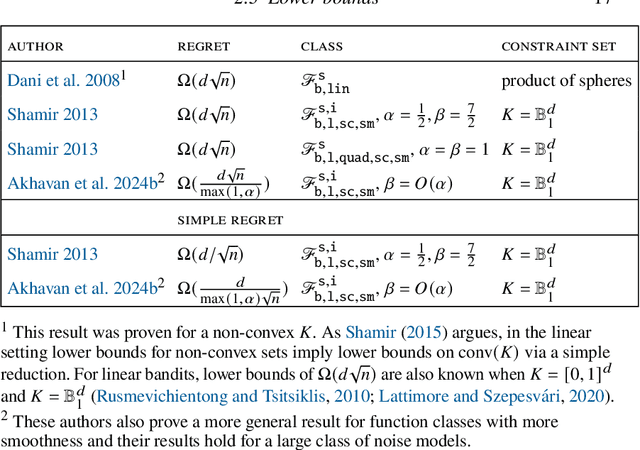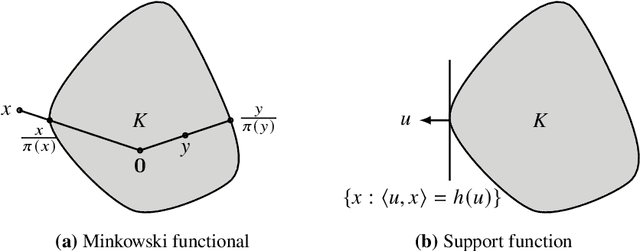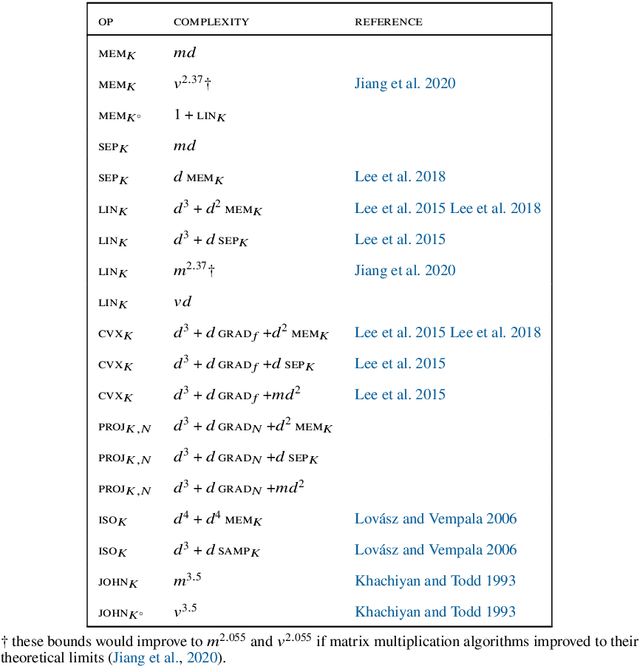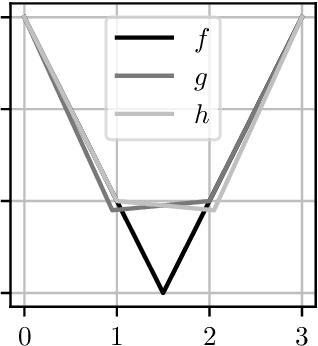Tor Lattimore
Online Newton Method for Bandit Convex Optimisation
Jun 10, 2024Abstract:We introduce a computationally efficient algorithm for zeroth-order bandit convex optimisation and prove that in the adversarial setting its regret is at most $d^{3.5} \sqrt{n} \mathrm{polylog}(n, d)$ with high probability where $d$ is the dimension and $n$ is the time horizon. In the stochastic setting the bound improves to $M d^{2} \sqrt{n} \mathrm{polylog}(n, d)$ where $M \in [d^{-1/2}, d^{-1 / 4}]$ is a constant that depends on the geometry of the constraint set and the desired computational properties.
Bandit Convex Optimisation
Feb 09, 2024



Abstract:Bandit convex optimisation is a fundamental framework for studying zeroth-order convex optimisation. These notes cover the many tools used for this problem, including cutting plane methods, interior point methods, continuous exponential weights, gradient descent and online Newton step. The nuances between the many assumptions and setups are explained. Although there is not much truly new here, some existing tools are applied in novel ways to obtain new algorithms. A few bounds are improved in minor ways.
Probabilistic Inference in Reinforcement Learning Done Right
Nov 22, 2023Abstract:A popular perspective in Reinforcement learning (RL) casts the problem as probabilistic inference on a graphical model of the Markov decision process (MDP). The core object of study is the probability of each state-action pair being visited under the optimal policy. Previous approaches to approximate this quantity can be arbitrarily poor, leading to algorithms that do not implement genuine statistical inference and consequently do not perform well in challenging problems. In this work, we undertake a rigorous Bayesian treatment of the posterior probability of state-action optimality and clarify how it flows through the MDP. We first reveal that this quantity can indeed be used to generate a policy that explores efficiently, as measured by regret. Unfortunately, computing it is intractable, so we derive a new variational Bayesian approximation yielding a tractable convex optimization problem and establish that the resulting policy also explores efficiently. We call our approach VAPOR and show that it has strong connections to Thompson sampling, K-learning, and maximum entropy exploration. We conclude with some experiments demonstrating the performance advantage of a deep RL version of VAPOR.
Context-lumpable stochastic bandits
Jun 22, 2023Abstract:We consider a contextual bandit problem with $S $ contexts and $A $ actions. In each round $t=1,2,\dots$ the learner observes a random context and chooses an action based on its past experience. The learner then observes a random reward whose mean is a function of the context and the action for the round. Under the assumption that the contexts can be lumped into $r\le \min\{S ,A \}$ groups such that the mean reward for the various actions is the same for any two contexts that are in the same group, we give an algorithm that outputs an $\epsilon$-optimal policy after using at most $\widetilde O(r (S +A )/\epsilon^2)$ samples with high probability and provide a matching $\widetilde\Omega(r (S +A )/\epsilon^2)$ lower bound. In the regret minimization setting, we give an algorithm whose cumulative regret up to time $T$ is bounded by $\widetilde O(\sqrt{r^3(S +A )T})$. To the best of our knowledge, we are the first to show the near-optimal sample complexity in the PAC setting and $\widetilde O(\sqrt{{poly}(r)(S+K)T})$ minimax regret in the online setting for this problem. We also show our algorithms can be applied to more general low-rank bandits and get improved regret bounds in some scenarios.
Sequential Best-Arm Identification with Application to Brain-Computer Interface
May 17, 2023Abstract:A brain-computer interface (BCI) is a technology that enables direct communication between the brain and an external device or computer system. It allows individuals to interact with the device using only their thoughts, and holds immense potential for a wide range of applications in medicine, rehabilitation, and human augmentation. An electroencephalogram (EEG) and event-related potential (ERP)-based speller system is a type of BCI that allows users to spell words without using a physical keyboard, but instead by recording and interpreting brain signals under different stimulus presentation paradigms. Conventional non-adaptive paradigms treat each word selection independently, leading to a lengthy learning process. To improve the sampling efficiency, we cast the problem as a sequence of best-arm identification tasks in multi-armed bandits. Leveraging pre-trained large language models (LLMs), we utilize the prior knowledge learned from previous tasks to inform and facilitate subsequent tasks. To do so in a coherent way, we propose a sequential top-two Thompson sampling (STTS) algorithm under the fixed-confidence setting and the fixed-budget setting. We study the theoretical property of the proposed algorithm, and demonstrate its substantial empirical improvement through both synthetic data analysis as well as a P300 BCI speller simulator example.
A Second-Order Method for Stochastic Bandit Convex Optimisation
Feb 10, 2023

Abstract:We introduce a simple and efficient algorithm for unconstrained zeroth-order stochastic convex bandits and prove its regret is at most $(1 + r/d)[d^{1.5} \sqrt{n} + d^3] polylog(n, d, r)$ where $n$ is the horizon, $d$ the dimension and $r$ is the radius of a known ball containing the minimiser of the loss.
Leveraging Demonstrations to Improve Online Learning: Quality Matters
Feb 08, 2023



Abstract:We investigate the extent to which offline demonstration data can improve online learning. It is natural to expect some improvement, but the question is how, and by how much? We show that the degree of improvement must depend on the quality of the demonstration data. To generate portable insights, we focus on Thompson sampling (TS) applied to a multi-armed bandit as a prototypical online learning algorithm and model. The demonstration data is generated by an expert with a given competence level, a notion we introduce. We propose an informed TS algorithm that utilizes the demonstration data in a coherent way through Bayes' rule and derive a prior-dependent Bayesian regret bound. This offers insight into how pretraining can greatly improve online performance and how the degree of improvement increases with the expert's competence level. We also develop a practical, approximate informed TS algorithm through Bayesian bootstrapping and show substantial empirical regret reduction through experiments.
Linear Partial Monitoring for Sequential Decision-Making: Algorithms, Regret Bounds and Applications
Feb 07, 2023Abstract:Partial monitoring is an expressive framework for sequential decision-making with an abundance of applications, including graph-structured and dueling bandits, dynamic pricing and transductive feedback models. We survey and extend recent results on the linear formulation of partial monitoring that naturally generalizes the standard linear bandit setting. The main result is that a single algorithm, information-directed sampling (IDS), is (nearly) worst-case rate optimal in all finite-action games. We present a simple and unified analysis of stochastic partial monitoring, and further extend the model to the contextual and kernelized setting.
Regret Bounds for Information-Directed Reinforcement Learning
Jun 09, 2022Abstract:Information-directed sampling (IDS) has revealed its potential as a data-efficient algorithm for reinforcement learning (RL). However, theoretical understanding of IDS for Markov Decision Processes (MDPs) is still limited. We develop novel information-theoretic tools to bound the information ratio and cumulative information gain about the learning target. Our theoretical results shed light on the importance of choosing the learning target such that the practitioners can balance the computation and regret bounds. As a consequence, we derive prior-free Bayesian regret bounds for vanilla-IDS which learns the whole environment under tabular finite-horizon MDPs. In addition, we propose a computationally-efficient regularized-IDS that maximizes an additive form rather than the ratio form and show that it enjoys the same regret bound as vanilla-IDS. With the aid of rate-distortion theory, we improve the regret bound by learning a surrogate, less informative environment. Furthermore, we extend our analysis to linear MDPs and prove similar regret bounds for Thompson sampling as a by-product.
Distributed Contextual Linear Bandits with Minimax Optimal Communication Cost
May 26, 2022

Abstract:We study distributed contextual linear bandits with stochastic contexts, where $N$ agents act cooperatively to solve a linear bandit-optimization problem with $d$-dimensional features. For this problem, we propose a distributed batch elimination version of the LinUCB algorithm, DisBE-LUCB, where the agents share information among each other through a central server. We prove that over $T$ rounds ($NT$ actions in total) the communication cost of DisBE-LUCB is only $\tilde{\mathcal{O}}(dN)$ and its regret is at most $\tilde{\mathcal{O}}(\sqrt{dNT})$, which is of the same order as that incurred by an optimal single-agent algorithm for $NT$ rounds. Remarkably, we derive an information-theoretic lower bound on the communication cost of the distributed contextual linear bandit problem with stochastic contexts, and prove that our proposed algorithm is nearly minimax optimal in terms of \emph{both regret and communication cost}. Finally, we propose DecBE-LUCB, a fully decentralized version of DisBE-LUCB, which operates without a central server, where agents share information with their \emph{immediate neighbors} through a carefully designed consensus procedure.
 Add to Chrome
Add to Chrome Add to Firefox
Add to Firefox Add to Edge
Add to Edge